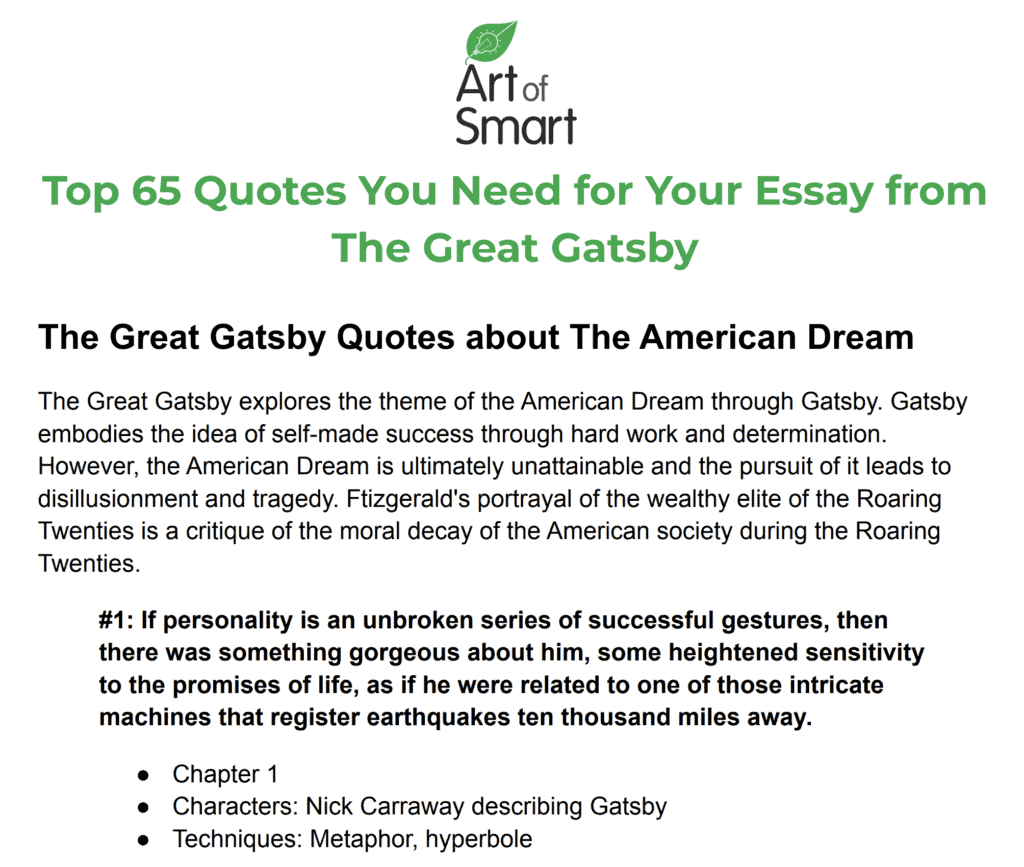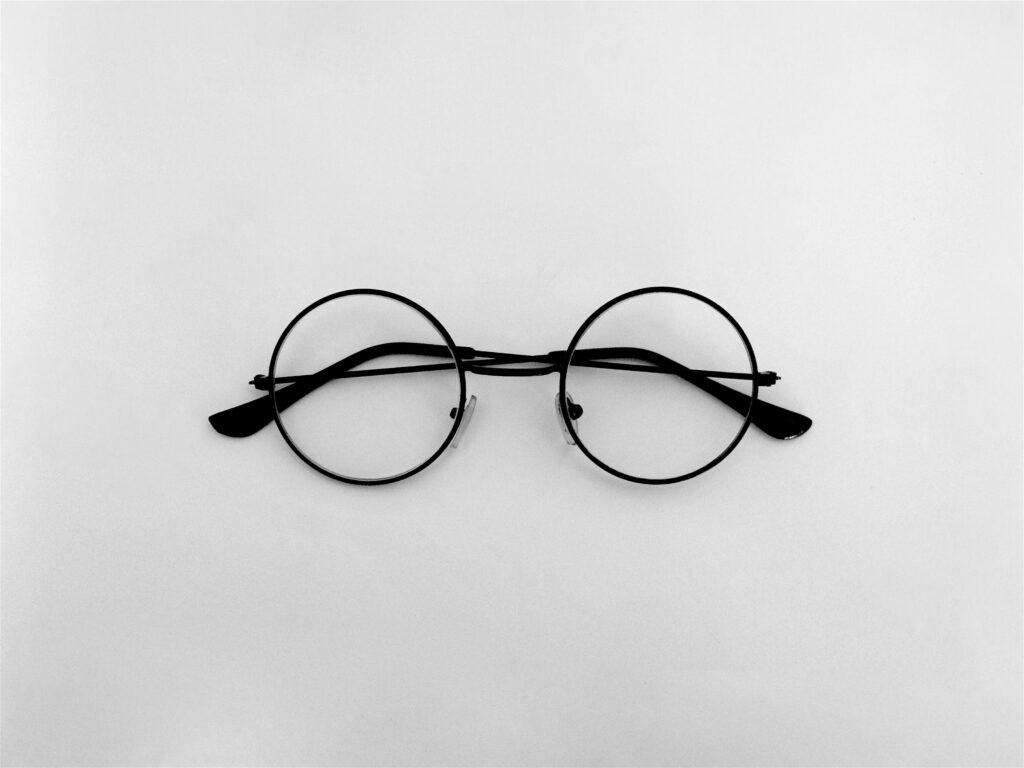Have you got an essay to write on The Great Gatsby, but are struggling to figure out which quotes you should analyse?
We’re here to help! We’ve categorised 65 quotes across a range of themes from The Great Gatsby to help inspire some ideas, and have even included some analysis to help you understand them better.
Keep reading to see which quotes from could be perfect for your essay!
The Great Gatsby Quotes about The American Dream
The Great Gatsby Quotes about Love
Daisy Quotes
The Great Gatsby Quotes about Wealth and Class
Quotes about The Valley of Ashes
The Great Gatsby Quotes about Time
The Great Gatsby Quotes about The American Dream
The Great Gatsby explores the theme of the American Dream through Gatsby. Gatsby embodies the idea of self-made success through hard work and determination. However, the American Dream is ultimately unattainable and the pursuit of it leads to disillusionment and tragedy. Ftizgerald’s portrayal of the wealthy elite of the Roaring Twenties is a critique of the moral decay of the American society during the Roaring Twenties.
#1: If personality is an unbroken series of successful gestures, then there was something gorgeous about him, some heightened sensitivity to the promises of life, as if he were related to one of those intricate machines that register earthquakes ten thousand miles away.
- Chapter 1
- Characters: Nick Carraway describing Gatsby
- Techniques: Metaphor, hyperbole
#2: “I’m p-paralyzed with happiness.”
- Chapter 1
- Characters: Daisy Buchanan
- Techniques: Stutter to show performativity and veiling
#3: They had spent a year in France, for no particular reason, and then drifted here and there unrestfully wherever people played polo and were rich together.
- Chapter 1
- Characters: Nick Carraway
- Techniques: Recount, poetic rhythm, satire
#4: High over the city our line of yellow windows must have contributed their share of human secrecy to the casual watcher in the darkening streets, and I was him too, looking up and wondering. I was within and without, simultaneously enchanted and repelled by the inexhaustible variety of life.
- Chapter 2
- Characters: Nick Carraway
- Techniques: Metaphor, imagery, internal monologue, contrast and tension
#5: I believe that on the first night I went to Gatsby’s house I was one of the few guests who had actually been invited. People were not invited—they went there.
- Chapter 2
- Characters: Nick Carraway
- Techniques: Reflection, inversion of the American Dream as something that in impersonal
#6: He stretched out his arms toward the dark water in a curious way, and, far as I was from him, I could have sworn he was trembling. Involuntarily I glanced seaward—and distinguished nothing except a single green light, minute and far away, that might have been at the end of a dock.
- Chapter 2
- Characters: Nick Carraway, Jay Gatsby
- Techniques: symbolism, imagery, metaphor of the green light
Analysis:
This quote establishes the character of Jay Gatsby as Nick observes him standing on the the edge of a dock and reaching out towards the water.
The green light is a recurring symbol of Gatsby’s longing for Daisy and his unfulfilled dream of winning her back. For Gatsby, winning Daisy’s love is the only piece of proof that he has lived out the American Dream.
However, the imagery of the “dark water” and the “single green light, minute and far away” evokes a forewarning of distance and struggle for something that is out of reach. Fitzgerald foreshadows the inevitability of Gatsby’s unfulfilled dreams, which is cleaved apart by his nouveau riche life in the West Egg and Daisy’s life in the “old money” East Egg.
In the line “I could have sworn he was trembling”, the characterisation of Gatsby breaks away from his initial facade as an outgoing, carefree man. Instead, we understand Gatsby’s true vulnerability and uncertainty of his life hinged upon an unrequited love.
#7: But young men didn’t—at least in my provincial inexperience I believed they didn’t—drift coolly out of nowhere and buy a palace on Long Island Sound.
- Chapter 3
- Characters: Nick Carraway
- Techniques: Satire
#8: It was testimony to the romantic speculation [Gatsby] inspired that there were whispers about him from those who had found little that it was necessary to whisper about in this world.
- Chapter 3
- Characters: Nick Carraway about Gatsby
- Techniques: Satire, symbolism
#9: There was music from my neighbor’s house through the summer nights. In his blue gardens men and girls came and went like moths among the whisperings and the champagne and the stars.
- Chapter 3
- Characters: Nick Carraway
- Techniques: Simile, proximity
Analysis:
This quote paints an image of the lavish parties that are held at Jay Gatsby’s mansion. The allure of Gatsby’s wealth and fame is also a commentary on the glamour and hedonism of the “Roaring Twenties”, where people are more focused on pleasure than on deeper values.
The auditory imagery of “music from my neighbour’s house through the summer nights” evokes the carefree pleasure of the hot summer nights in Gatsby’s “blue gardens”.
The simile “came and went like moths” compares the people at Gatsby’s parties to moths – like moths drawn to the light, people are drawn to the mysterious spectacle of Gatsby’s wealth.
The further use of polysydeton in the line “among the whisperings and the champagne and the stars” emphasises the excess and abundance of Gatsby spends on his parties. There is a contrasting sense of mystery to the word “whisperings” (an euphemism for gossip) stands out as a dark foreshadowing against Gatsby’s parties.
#10: I was looking at an elegant young roughneck, a year or two over thirty, whose elaborate formality of speech just missed being absurd.
- Chapter 3
- Characters: Nick Carraway
- Techniques: Descriptive
Access our downloadable list of 65 quotes from The Great Gatsby!
#11: [Gatsby] was balancing himself on the dashboard of his car with that resourcefulness of movement that is so peculiarly American—that comes, I suppose, with the absence of lifting work or rigid sitting in youth and, even more, with the formless grace of our nervous, sporadic games.
- Chapter 4
- Characters: Nick Carraway
- Techniques: Internal monologue, imagery, satire
#12: Over the great bridge, with the sunlight through the girders making a constant flicker upon the moving cars, with the city rising up across the river in white heaps and sugar lumps all built with a wish out of non-olfactory money.
- Chapter 4
- Characters: Nick Carraway
- Techniques: Metaphor, recount
#13: “They’re such beautiful shirts,” she sobbed, her voice muffled in the thick folds. “It makes me sad because I’ve never seen such—such beautiful shirts before.”
- Chapter 5
- Characters: Daisy Buchanan
- Techniques: Hyperbole, dialogue, repetition, pause
#14: The truth was that Jay Gatsby of West Egg, Long Island, sprang from his Platonic conception of himself. He was a son of God—a phrase which, if it means anything, means just that—and he must be about His Father’s business, the service of a vast, vulgar, and meretricious beauty. So he invented just the sort of Jay Gatsby that a seventeen-year-old boy would be likely to invent, and to this conception he was faithful to the end.
- Chapter 6
- Characters: Nick Carraway
- Techniques: Religious imagery, parallel between Jesus and Gatsby, inception
#15: He hurried the phrase “educated at Oxford,” or swallowed it, or choked on it, as though it had bothered him now. And with this doubt, his whole statement fell to pieces, and I wondered if there wasn’t something a little sinister about him, after all.
- Chapter 6
- Characters: Nick Carraway
- Techniques: Recount, inception as Nick realises Gatsby to be a liar
Analysis:
This quote explores the moment when Gatsby mentions that he had been educated at Oxford, but in a way that makes Nick doubt the truth of his statement. The phrase “educated at Oxford” breaks away from Gatsby’s articulate character, and Nick starts to wonder if there is something “sinister” or dishonest about him.
The phrase “educated at Oxford” is a symbol of wealth, intelligence and good background. However, in Gatsby’s case, it is ironic because it causes Nick to doubt and mistrust Gatsby’s words.
The imagery of Gatsby “hurr[ying] the phrase…or swallowed it, or choked on it” depicts his nervousness, wherein the connotations of “choke” suggest its incompatibility with the truth of Gatsby’s past and intentions.
#16: [Daisy and Tom] weren’t happy, and neither of them had touched the chicken or the ale—and yet they weren’t unhappy either
- Chapter 7
- Characters: Nick Carraway
- Techniques: Contrast, monotony
#17: Gatsby was overwhelmingly aware of the youth and mystery that wealth imprisons and preserves, of the freshness of many clothes, and of Daisy, gleaming like silver, safe and proud above the hot struggles of the poor.
- Chapter 8
- Characters: Nick Carraway
- Techniques: Listing, imagery, metaphor, onomatopoeia
Analysis:
This quote describes how Gatsby is aware of the artificiality and superficiality of his lifestyle, and that he is unable to escape from it. Gatsby’s wealth is supposed to symbolise the American Dream, but it is not providing Gatsby with the happiness and fulfilment he desires.
The phrase “wealth imprisons” personifies wealth and gives it the ability to hold someone captive. Despite Gatsby using his wealth to create an image of himself, it prevents him from truly understanding or connecting with Daisy.
There is irony in the phrase “wealth imprisons and preserves” as Gatsby’s wealth does not provide him with freedom and security — it only divides him further from Daisy.
Finally, the quote uses contrasting imagery between “Daisy, gleaming like silver” and “the hot struggles of the poor” to cement the divide between the rich and the poor in the novel.
#18: [Gatsby] must have felt that he had lost the old warm world, paid a high price for living too long with a single dream. He must have looked up at an unfamiliar sky through frightening leaves and shivered as he found what a grotesque thing a rose is and how raw the sunlight was upon the scarcely created grass.
- Chapter 8
- Characters: Nick Carraway
- Techniques: Speculation, alliteration
#19: Daisy was young and her artificial world was redolent of orchids and pleasant, cheerful snobbery and orchestras which set the rhythm of the year, summing up the sadness and suggestiveness of life in new tunes.
- Chapter 8
- Characters: Nick Carraway
- Techniques: Sibilance, listing, metaphor
#20: Just before I reached the hedge I remembered something . . . ‘They’re a rotten crowd,’ I shouted . . . ‘You’re worth the whole damn bunch put together.’ I’ve always been glad I said that. It was the only compliment I ever gave him, because I disapproved of him from beginning to end.
- Chapter 8
- Characters: Nick Carraway
- Techniques: Dialogue, contrast between spoken and internal monologue, metaphor, swearing for symbolism
#21: I see now that this has been a story of the West, after all—Tom and Gatsby, Daisy and Jordan and I, were all Westerners, and perhaps we possess some deficiency in common which made us subtly unadaptable to Eastern life.
- Chapter 9
- Characters: Nick Carraway
- Techniques: Reflection, geographic imagery, listing
#22: After Gatsby’s death the East was haunted for me like that, distorted beyond my eyes’ power of correction. So when the blue smoke of brittle leaves was in the air and the wind blew the wet laundry stiff on the line I decided to come back home.
- Chapter 9
- Characters: Nick Carraway
- Techniques: Metaphor, reflection
#23: And as I sat there brooding on the old, unknown world, I thought of Gatsby’s wonder when he first picked out the green light at the end of Daisy’s dock.
- Chapter 9
- Characters: Nick Carraway
- Techniques: Reflection, metaphor
#24: Gatsby believed in the green light, the orgastic future that year by year recedes before us.
- Chapter 9
- Characters: Nick Carraway
- Techniques: Biblical connotations, contrast, metaphor, disappointing tone
Analysis:
The quote is spoken by the narrator, Nick Carraway, as he reflects Gatsby’s belief in the illusion of the green light. Despite the hope for a “orgastic future” with Daisy, Gatsby’s dream is constantly slipping away.
The biblical connotations in the phrase “Gatsby believed in the green light” suggest that Gatsby’s American dream of winning Daisy’s love was a sort of religion to her. It follows that the “orgastic future” is a metaphor for his hope that his future with Daisy is within reach.
This contrasts with Nick’s final words, where the tone shifts to one of disappoint as Nick he remarks that “that year by year recedes before us”.
The Great Gatsby Quotes about Love
The theme of love is explored through Gatsby and his unrequited love for Daisy Buchanan. Gatsby’s love for Daisy is the driving force behind his pursuit of wealth and desire to be accepted by her upper-class social circle. While his love for Daisy is pure and selfless, it is doomed from the start given Daisy’s upper-class values of materialism and superficiality over human connection.
Despite Gatsby’s efforts to remake himself and win Daisy back, it leads to his self-destruction when he steps into the moral decay of the wealthy elite.
#25: There was an excitement in her voice that men who had cared for her found difficult to forget: a singing compulsion, a whispered “Listen,” a promise that she had done gay, exciting things just a while since and that there were gay, exciting things hovering in the next hour.
- Chapter 1
- Characters: Nick Carraway
- Techniques: Analysis of voice
#26: [Myrtle] was in the middle thirties, and faintly stout, but she carried her surplus flesh sensuously as some women can.
- Chapter 2
- Characters: Nick Carraway
- Techniques: Descriptive
#27: “I married [George] because I thought he was a gentleman,” she said finally. “I thought he knew something about breeding, but he wasn’t fit to lick my shoe.”
- Chapter 2
- Characters: Myrtle Wilson
- Techniques: Dialogue, misunderstanding, metaphor
#28: “She’s got an indiscreet voice,” I remarked. “It’s full of—” I hesitated.
- Chapter 7
- Characters: Nick Carraway
- Techniques: Repeated analysis of Daisy’s voice, characterisation
#29: Making a short deft movement, Tom Buchanan broke [Myrtle’s] nose with his open hand.
- Chapter 2
- Characters: Nick Carraway
- Techniques: Retelling
#30: ‘It’s really his wife that’s keeping them apart. She’s a Catholic, and they don’t believe in divorce.’
Daisy was not a Catholic, and I was a little shocked at the elaborateness of the lie.
- Chapter 2
- Characters: Catherine/Nick Carraway
- Techniques: Dialogue, religious imagery, inversion
#31: She held my hand impersonally, as a promise that she’d take care of me in a minute, and gave ear to two girls in twin yellow dresses, who stopped at the foot of the steps.
- Chapter 3
- Characters: Nick Carraway on Jordan Baker
- Techniques: Retelling, character movements
#32: It was dark now, and as we dipped under a little bridge I put my arm around Jordan’s golden shoulder and drew her toward me and asked her to dinner. Suddenly I wasn’t thinking of Daisy and Gatsby any more, but of this clean, hard, limited person, who dealt in universal scepticism, and who leaned back jauntily just within the circle of my arm. A phrase began to beat in my ears with a sort of heady excitement: ‘There are only the pursued, the pursuing, the busy, and the tired.’
- Chapter 4
- Characters: Nick Carraway
- Techniques: Contrast, listicle, internal monologue
#33: [Gatsby] hadn’t once ceased looking at Daisy, and I think he revalued everything in his house according to the measure of response it drew from her well-loved eyes. Sometimes, too, he stared around at his possessions in a dazed way, as though in her actual and astounding presence none of it was any longer real.
- Chapter 5
- Characters: Nick Carraway
- Techniques: Imagery
#34: ‘If it wasn’t for the mist we could see your home across the bay,’ said Gatsby. ‘You always have a green light that burns all night at the end of your dock.’
- Chapter 5
- Characters: Gatsby, as narrated by Nick
- Techniques: Imagery, metaphor of the green light as longing, motif
#35: There must have been moments even that afternoon when Daisy tumbled short of his dreams—not through her own fault, but because of the colossal vitality of his illusion. It had gone beyond her, beyond everything. He had thrown himself into it with a creative passion, in addition to it all the time. . . . No amount of fire or freshness can challenge what a man will store up in his ghostly heart.
- Chapter 5
- Characters: Nick Carraway
- Techniques: Reflective tone
#36: I wonder where in the devil he met Daisy. By God, I may be old-fashioned in my ideas, but women run around too much these days to suit me. They meet all kinds of crazy fish.’
- Chapter 6
- Characters: Tom Buchanan
- Techniques: Metaphor, contrast
#37: ‘I wouldn’t ask too much of her,’ I ventured. ‘You can’t repeat the past.’
‘Can’t repeat the past?’ he cried incredulously. ‘Why of course you can!’
- Chapter 6
- Characters: Gatsby and Nick
- Techniques: Comparison, dialogue, unanswered contrast
Analysis:
This quote depicts Gatsby’s optimism in repeating the past and regaining Daisy’s love. His belief that one can repeat the past is an illusion and highlights the futility of chasing the past. The failure to acknowledge this leads to Gatsby’s downfall.
The use of irony is effectively shown in desperation in Gatsby’s tone, wherein he “crie[s] incredulously”. This reveals Gatsby’s fixation on the past, despite the fact that Gatsby’s efforts to regain Daisy’s love are proven futile.
Gatsby’s desperation contrasts to Nick’s practical and cautious mind, who tells Gatsby “I wouldn’t ask too much of her”.
#38: His heart beat faster and faster as Daisy’s white face came up to his own. He knew that when he kissed this girl, and forever wed his unutterable visions to her perishable breath, his mind would never romp again like the mind of God. So he waited, listening for a moment longer to the tuning fork that had been struck upon a star. Then he kissed her. At his lips’ touch she blossomed for him like a flower and the incarnation was complete.
- Chapter 6
- Characters: Nick Carraway
- Techniques: Repetition, onomatopoeia, religious imagery, simile
#39: [Wilson] had discovered that Myrtle had some sort of life apart from him in another world, and the shock had made him physically sick. I stared at him and then at Tom, who had made a parallel discovery less than an hour before—and it occurred to me that there was no difference between men, in intelligence or race, so profound as the difference between the sick and the well.
- Chapter 7
- Characters: Nick Carraway
- Techniques: Religious imagery, contrast, parallelism
#40: Generally he was one of these worn-out men: when he wasn’t working he sat on a chair in the doorway and stared at the people and the cars that passed along the road. When any one spoke to him he invariably laughed in an agreeable, colorless way. He was his wife’s man and not his own.
- Chapter 7
- Characters: Michaelis (narrator for a brief time) speaking of George
- Techniques: Contrast, generalisation
#41: Daisy and Tom were sitting opposite each other at the kitchen table with a plate of cold fried chicken between them and two bottles of ale.
- Chapter 7
- Characters: Nick Carraway
- Techniques: Symbolism
#42: Thirty—the promise of a decade of loneliness, a thinning list of single men to know, a thinning briefcase of enthusiasm, thinning hair. But there was Jordan beside me, who, unlike Daisy, was too wise ever to carry well-forgotten dreams from age to age. As we passed over the dark bridge . . . the formidable stroke of thirty died away with the reassuring pressure of her hand. So we drove on toward death through the cooling twilight.
- Chapter 7
- Characters: Nick Carraway
- Techniques: Metaphor, imagery, contrast
#43: It excited him, too, that many men had already loved Daisy—it increased her value in his eyes.
- Chapter 8
- Characters: Nick Carraway
- Techniques: Commoditisation, reflection
#44: As he lay in his house and didn’t move or breathe or speak, hour upon hour, it grew upon me that I was responsible, because no one else was interested—interested, I mean, with that intense personal interest to which every one has some vague right at the end.
- Chapter 9
- Characters: Nick Carraway
- Techniques: Time symbolism, internal monologue, reflection
#45: You said a bad driver was only safe until she met another bad driver? Well, I met another bad driver, didn’t I? I mean it was careless of me to make such a wrong guess. I thought you were rather an honest, straightforward person. I thought it was your secret pride.
- Chapter 9
- Characters: Jordan Baker
- Techniques: Extended metaphor
Daisy Quotes
Daisy Buchanan is the object of Gatsby’s desire. She is depicted as a complex and alluring woman who represents the wealthy elite of the Roaring Twenties. She is both shown to be carefree yet longing for something more as she lives a life of emptiness. Daisy is married to Tom Buchanan, an equally wealthy and powerful man who is unfaithful to her. Despite her husband’s infidelity and the shallow nature of their relationship, Daisy remains loyal to him.
#46: “I’m glad it’s a girl. And I hope she’ll be a fool—that’s the best thing a girl can be in this world, a beautiful little fool.”’
- Chapter 1
- Characters: Daisy Buchanan
- Techniques: Internal reflection, irony in the idea of a fool being ‘beautiful’, as they will be protected from the reality of a man’s world
#47: ‘It’s really his wife that’s keeping them apart. She’s a Catholic, and they don’t believe in divorce.’
Daisy was not a Catholic, and I was a little shocked at the elaborateness of the lie.
- Chapter 2
- Characters: Catherine/Nick Carraway
- Techniques: Dialogue, religious imagery, inversion
#48: “We haven’t met for many years,” said Daisy, her voice as matter-of-fact as it could ever be.
“Five years next November.”
- Chapter 5
- Characters: Daisy Buchanan and Gatsby
- Techniques: Dialogue, contrast, pause
#49: “Oh, you want too much!” she cried to Gatsby. “I love you now—isn’t that enough? I can’t help what’s past.” She began to sob helplessly. “I did love him once—but I loved you too.”
- Chapter 7
- Characters: Daisy Buchanan
- Techniques: Dialogue, contrast, pause
The Great Gatsby Quotes about Wealth and Class
Wealth and class are explored through the interactions, expectations and social realities that closely reflect the wealthy elite of the Roaring Twenties. Gatsby, who has amassed great wealth through his own work, is still not fully accepted by Tom and Daisy Buchanan who come from old money. Gatsby’s dream to win back Daisy’s love is ultimately unachievable because of this tension between the nouveau riche and old money aristocracy. It is clear through Gatsby’s efforts that all characters, despite their wealth and status, are deeply unhappy and unfulfilled.
#50: In my younger and more vulnerable years my father gave me some advice that I’ve been turning over in my mind ever since. ‘Whenever you feel like criticising any one,’ he told me, ‘just remember that all the people in this world haven’t had the advantages that you’ve had.’
- Chapter 1
- Characters: Nick Carraway
- Techniques: Dialogue, reflection
#51: [Daisy’s] husband, among various physical accomplishments, had been one of the most powerful ends that ever played football at New Haven—a national figure in a way, one of those men who reach such an acute limited excellence at twenty-one that everything afterward savours of anticlimax.
- Chapter 1
- Characters: Nick Carraway
- Techniques: Descriptive, reflection
Analysis:
This quote describes Daisy’s husband, Tom Buchanan. The quote highlights how Tom’s successful football career at such a young age has led to everything else in his life feeling like a disappointment.
The use of litotes (an understated way of saying something is very good) in “acute limited excellence” evokes a sense of entrapment in Tom’s achievements. Despite reaching national success, Tom’s sense of fulfilment dwindles as more time passes after his football career.
Tom’s crumbling sense of achievement is shown in the imagery “everything afterward savours of anticlimax”. This evokes the sense of futility and, despite being from old money, it suggests that the American Dream is even unfulfilling to Tom.
#52: Two shining arrogant eyes had established dominance over his face and gave him the appearance of always leaning aggressively forward. Not even the effeminate swank of his riding clothes could hide the enormous power of that body—he seemed to fill those glistening boots until he strained the top lacing, and you could see a great pack of muscle shifting when his shoulder moved under his thin coat. It was a body capable of enormous leverage—a cruel body.
- Chapter 1
- Characters: Nick Carraway on Tom Buchanan
- Techniques: Contrast, description, characterisation, personification of eyes
#53: Well, it’s a fine book, and everybody ought to read it. The idea is if we don’t look out the white race will be—will be utterly submerged. It’s all scientific stuff; it’s been proved
- Chapter 1
- Characters: Tom Buchanan
- Techniques: Dialogue to highlight Tom’s racism
#54: ‘You make me feel uncivilized, Daisy,’ I confessed on my second glass of corky but rather impressive claret. ‘Can’t you talk about crops or something?’
- Chapter 1
- Characters: Nick Carraway
- Techniques: Dialogue, first person narration
#55: But above the grey land and the spasms of bleak dust which drift endlessly over it, you perceive, after a moment, the eyes of Doctor T.J. Eckleburg. The eyes of Doctor T.J. Eckleburg are blue and gigantic.
- Chapter 2
- Characters: Nick Carraway
- Techniques: Metaphor, rhythm, juxtaposition of wealthy eyes and bleak town
#56: The city seen from the Queensboro Bridge is always the city seen for the first time, in its first wild promise of all the mystery and the beauty in the world.
- Chapter 4
- Characters: Nick Carraway
- Techniques: Perspective
#57: A brewer had built it in the ‘period’ craze, a decade before, and there was a story that he’d agreed to pay five years’ taxes on all the neighbouring cottages if the owners would have their roofs thatched with straw. Perhaps their refusal took the heart out of this plan.
- Chapter 5
- Characters: Nick Carraway
- Techniques: Contrast, satire
#58: ‘Who is this Gatsby anyhow?’ demanded Tom suddenly. ‘Some big bootlegger?’
‘Where’d you hear that?’ I inquired.
‘I didn’t hear it. I imagined it. A lot of these newly rich people are just big bootleggers, you know.’
‘Not Gatsby,’ I said shortly.
- Chapter 6
- Characters: Tom and Nick
- Techniques: Dialogue, colloquialisms
Valley of Ashes Quotes
The “valley of ashes” is a bleak and desolate location home to the working-class people who live in poverty. The location is symbolic and is placed between the city of New York and Fitzgerald’s Long Island to contrast the opulence and excess of the wealthy characters’ lifestyles. It reminds us of the harsh and immoral expense of the elite’s lifestyles on the less fortunate.
#59: About half way between West Egg and New York the motor road hastily joins the railroad and runs beside it for a quarter of a mile, so as to shrink away from a certain desolate area of land. This is a valley of ashes—a fantastic farm where ashes grow like wheat . . . where ashes take the forms of houses.
- Chapter 2
- Characters: Nick Carraway
- Techniques: Metaphor, imagery, alliteration
#60: The valley of ashes is bounded on one side by a small foul river, and, when the drawbridge is up to let barges through, the passengers on waiting trains can stare at the dismal scene for as long as half an hour. There is always a halt there of at least a minute, and it was because of this that I first met Tom Buchanan’s mistress.
- Chapter 2
- Characters: Nick Carraway
- Techniques: Metaphor, motif, imagery of despair
Analysis:
This quote introduces the Valley of Ashes, a location between Long Island and New York that is filled with squalor and pollution. It also reveals Tom Buchanan’s affair.
The imagery in the phrases “a small foul river” and “dismal scene” serve as a symbol of moral decay, poverty, and the consequences of industrialisation. The Valley of Ashes serves as contrast to the luxurious lifestyle of those in Long Island and how the lavish parties of the wealthy depend on the poverty of thousands.
The use of parataxis in the phrase “it was because of this that I first met Tom Buchanan’s mistress” explores another representation of moral decay and, like the wreckage in the Valley of Ashes, it foreshadows the consequences of Tom’s infidelity.
#61: When I passed the ashheaps on the train that morning I had crossed deliberately to the other side of the car.
- Chapter 8
- Characters: Nick Carraway
- Techniques: Recount of movements, exclusion
The Great Gatsby Quotes About Time
Gatsby spends the entire novel working to recreate the past — specifically, to recapture his past relationship with Daisy. Gatsby’s attempts are ultimately futile and time moves forward to bring about tragic ending to Gatsby’s life.
#62: Next day at five o’clock she married Tom Buchanan without so much as a shiver and started off on a three months’ trip to the South Seas.
- Chapter 4
- Characters: Daisy Buchanan, Tom Buchanan
- Techniques: Recounting, sibilance, metaphor
#63: Luckily the clock took this moment to tilt dangerously at the pressure of his head, whereupon he turned and caught it with trembling fingers, and set it back in place.
- Chapter 5
- Characters: Jay Gatsby, Daisy Buchanan
- Techniques: Motif, symbolism
Analysis:
This pivotal quote demonstrates how Gatsby is essentially trying to stop time. In this scene, Gatsby is so emotionally overwhelmed by meeting Daisy that he leans his head on a clock and causes it to tilt.
There is a strong use of symbolism when Gatsby leans on and tilts the clock. As a symbol of time, his action of catching the clock and setting it “back in place” suggests that he cannot let go of the past. Further, the personification of the clock in the phrase “the clock took this moment” suggest the unforgiving and inevitable passage of time.
The tone in the phrase “tilt dangerously” and “trembling fingers” creates a foreshadowing sense of vulnerability in Gatsby’s character. It is ultimately reinforcing that time will catch up with Gatsby despite all efforts to repeat the past.
#64: A universe of ineffable gaudiness spun itself out in his brain while the clock ticked on the wash-stand and the moon soaked with wet light his tangled clothes upon the floor.
- Chapter 6
- Characters: Jay Gatsby
- Techniques: Imagery, motif
#65: At two o’clock Gatsby put on his bathing-suit and left word with the butler that if any one phoned word was to be brought to him at the pool.
- Chapter 9
- Characters: Jay Gatsby
- Techniques: Dramatic irony, motif
On the hunt for quotes from other texts aside from The Great Gatsby?
If you’ve found our quotes from The Great Gatsby useful, you should check out our list of quotes for the following texts:
- Jasper Jones
- Frankenstein
- Jojo Rabbit
- Lord of the Flies
- Away
- Blade Runner
- Hamlet
- Pride and Prejudice
- To Kill a Mockingbird
- Never Let Me Go
- The Tempest
- Things Fall Apart
- One Flew Over the Cuckoo’s Nest
- Rainbow’s End
If you need more help understanding techniques listed for some of our quotes from the Great Gatsby, check out our guide to literary techniques!
Are you looking for some extra help with your analysis of quotes from The Great Gatsby?
We have an incredible team of English tutors and mentors!
We can help you master your analysis of quotes from The Great Gatsby by taking you through the summary, context, key characters and themes. We’ll also help you ace your upcoming English assessments with personalised lessons conducted one-on-one in your home, online or at one of our state of the art campuses in Hornsby or the Hills!
We’ve supported over 8,000 students over the last 11 years, and on average our students score mark improvements of over 20%!
To find out more and get started with an inspirational tutor and mentor, get in touch today or give us a ring on 1300 267 888!
Lucinda Garbutt-Young hopes to one day be writing for a big-shot newspaper… or maybe just for a friendly magazine in the arts sector. Right now, she is enjoying studying a Bachelor of Public Communication (Public Relations and Journalism) at UTS while she writes on the side. She also loves making coffees for people in her job as a barista, and loves nothing more than a sun shower.








